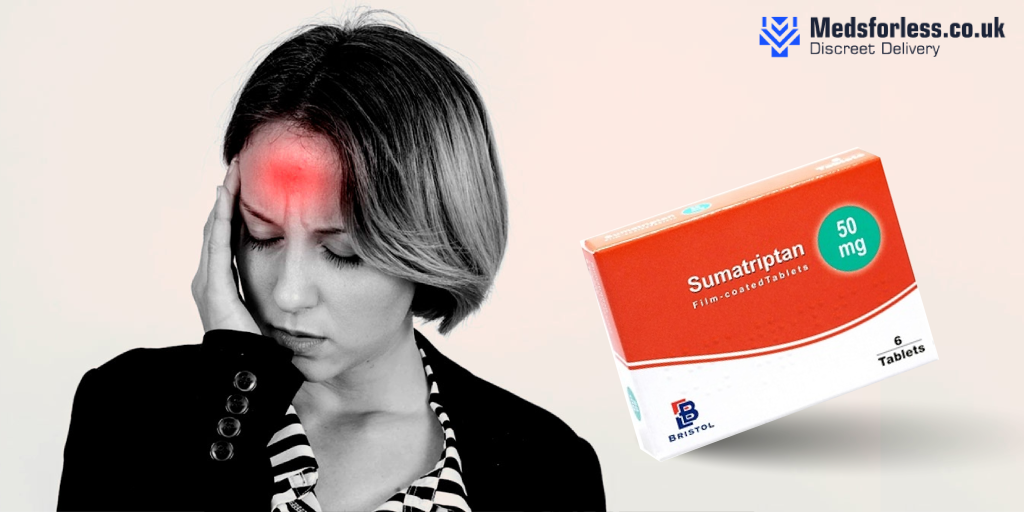Back To Top
For most of us, the sudden onset of migraine is a dark room, bed, and a cool towel. While the symptoms come out of nowhere,...

For most of us, the sudden onset of migraine is a dark room, bed, and a cool towel. While the symptoms come out of nowhere, many find that there are a few signs that a migraine attack is on its way. These signs reveal a pattern in the symptoms. However, there are some preventative ways to manage migraines. Everyone has different triggers, but some common things affect a significant number of people living with migraine.
When you can identify your triggers, you are one step closer to effectively managing them and avoiding future attacks. For faster relief, buy Sumatriptan Online from trusted sources. Read on to learn more about migraine trigger points and how you can manage them.
1. Stress
Perhaps the biggest of all, stress is a trigger for 70% of people with migraine. As per one study, 50-70% of people had an association between their daily stress and their daily migraine. When you carry the perpetual worry of when the next attack will strike, it can feel like a never-ending, exhausting cycle.
How to cope:
2. Changes/ Irregular sleep schedule
There is a strong connection between migraines and sleep, which is evident. Sleep repairs and renews all parts of the body, including the brain. Thus, it makes sense that when you have an irregular sleep schedule, you are more prone to migraine attacks. Additionally, when it comes to sleep, the early half of migraine attacks take place between 4:00 a.m. and 9:00 a.m. This puts people at a greater risk of developing a sleep disorder.
How to cope:
3. Hormones
Studies say that women are three times more likely to have migraines than men. More than 75% of women experience attacks around the time of their menstrual period, which is called “menstrual migraine. It occurs only during periods due to changes in estrogen and progesterone levels.
How to cope: Besides changes in lifestyle and diet, some methods of birth control can stabilize hormone levels and, therefore, prevent future migraine attacks. Make sure to see a doctor or your gynecologist so you can find the right treatment plan.
4. Caffeine and Alcohol
Many people find their symptoms of migraine rise after consuming caffeine or alcohol. Conversely, others say that a cup of coffee can stop their migraine symptoms. Also, there are some medications designed to fight migraine pain that contain a dose of caffeine.
People with migraine consider red wine to be the main migraine trigger. However, studies show other types of alcohol are just as likely and even more frequently the reason of migraine.
How to cope:
5. Changes in the weather
Storms, excessive heat, and changes in the outer environment are common weather-related migraine triggers. They can even lead to a migraine attack. High humidity and heat can further lead to dehydration, another common trigger point.
How to cope: We can’t control the weather. If the current conditions are unfavorable for your migraine, stay home or adjust your schedule accordingly. If you are experiencing migraine or want immediate relief with an effective medicine, buy Sumatriptan online.
6. Diet
There’s a long list of foods known to trigger a migraine attack. The most common foods contain dairy products, artificial sweeteners, histamine and MSG, chocolate, cheese, caffeine, and anything that has a strong smell.
How to cope:
7. Dehydration
Dehydration is a common trigger for migraine headaches, with approximately one-third of migraine sufferers citing it as a significant factor. For some individuals, even minor dehydration can swiftly escalate into intense head pain and discomfort. The impact of dehydration extends beyond headaches; it can affect the body on various levels, leading to symptoms such as dizziness and confusion, and in severe cases, it can even result in a medical emergency. Therefore, maintaining proper hydration levels is crucial for migraine management and overall well-being.
How to cope: To prevent dehydration-triggered migraines, always carry a water bottle, track your daily fluid intake (aim for around two liters), and minimize consumption of diuretics like caffeine and alcohol. Drinking water promptly when experiencing symptoms can sometimes stop a migraine.
The Bottom Line
While migraines can be frustrating, they are manageable with the right care and attention. Whether consulting with a healthcare professional or trying home remedies, many effective ways exist to treat the symptoms and improve quality of life. Buy Sumatriptan online for fast relief from trusted platforms like Medsforless. Seek guidance from our licensed experts to proactively manage your migraines for a more comfortable life.
No FAQs available.
| Cookie | Duration | Description |
|---|---|---|
| cookielawinfo-checkbox-analytics | 11 months | This cookie is set by GDPR Cookie Consent plugin. The cookie is used to store the user consent for the cookies in the category "Analytics". |
| cookielawinfo-checkbox-functional | 11 months | The cookie is set by GDPR cookie consent to record the user consent for the cookies in the category "Functional". |
| cookielawinfo-checkbox-necessary | 11 months | This cookie is set by GDPR Cookie Consent plugin. The cookies is used to store the user consent for the cookies in the category "Necessary". |
| cookielawinfo-checkbox-others | 11 months | This cookie is set by GDPR Cookie Consent plugin. The cookie is used to store the user consent for the cookies in the category "Other. |
| cookielawinfo-checkbox-performance | 11 months | This cookie is set by GDPR Cookie Consent plugin. The cookie is used to store the user consent for the cookies in the category "Performance". |
| viewed_cookie_policy | 11 months | The cookie is set by the GDPR Cookie Consent plugin and is used to store whether or not user has consented to the use of cookies. It does not store any personal data. |